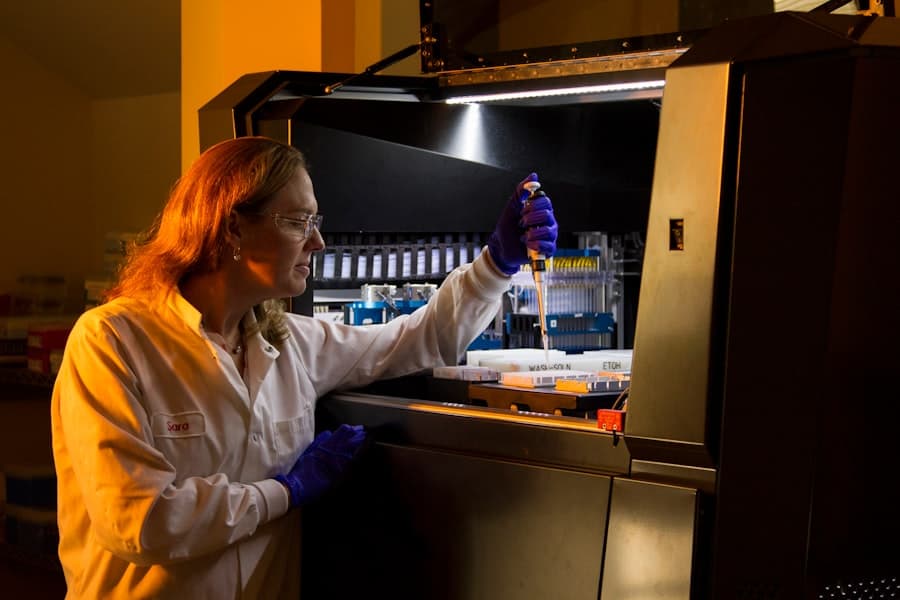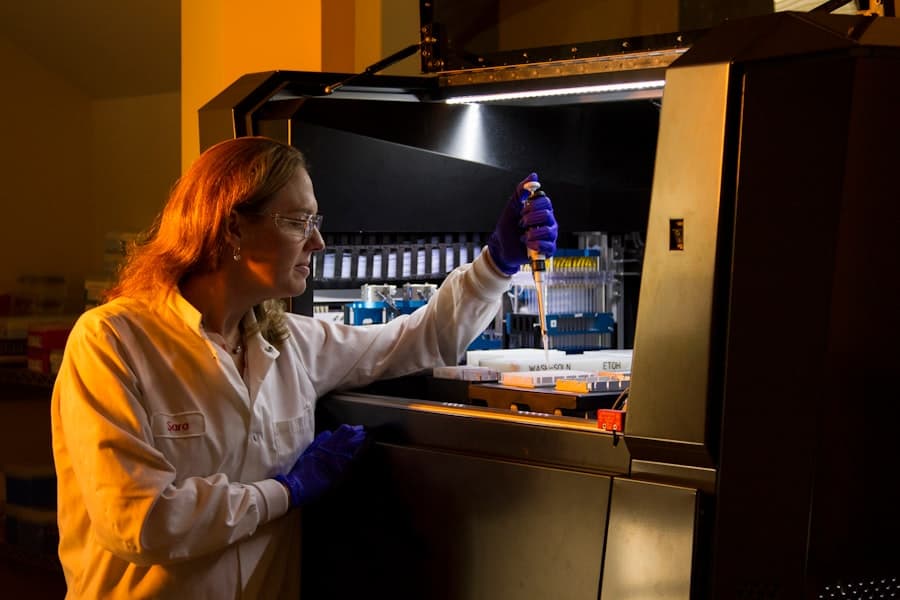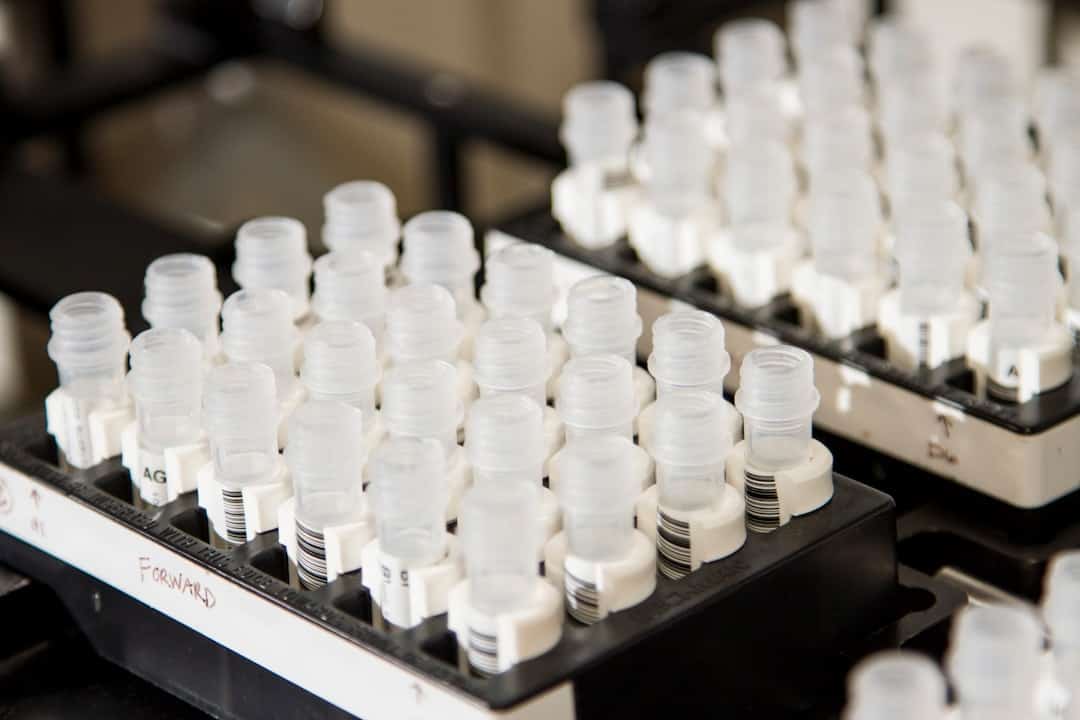Precision medicine represents a transformative approach to healthcare that tailors medical treatment to the individual characteristics of each patient. Unlike the traditional “one-size-fits-all” model, precision medicine considers factors such as genetics, environment, and lifestyle to devise more effective treatment strategies. This paradigm shift is made possible by advancements in technology, particularly artificial intelligence (AI), which has the potential to analyze vast amounts of data and uncover patterns that would be impossible for humans to discern.
The integration of AI into precision medicine is not merely an enhancement; it is a fundamental change in how healthcare providers understand and treat diseases. AI’s role in precision medicine is multifaceted, encompassing everything from diagnostics to treatment planning and drug development. By leveraging machine learning algorithms and data analytics, AI can process complex datasets, including genomic information, electronic health records, and clinical trial data.
This capability allows for more accurate disease predictions and personalized treatment options. As healthcare continues to evolve, the synergy between AI and precision medicine promises to revolutionize patient care, making it more efficient, effective, and tailored to individual needs.
Key Takeaways
- Precision medicine utilizes AI to analyze large amounts of data for personalized treatment plans
- AI-powered tools aid in early diagnostics and disease prediction, improving patient outcomes
- Personalized treatment plans are developed with the help of AI, taking into account individual genetic and environmental factors
- AI accelerates drug discovery and development, leading to more targeted and effective treatments
- AI-powered tools for genomic analysis enable more accurate and comprehensive understanding of genetic variations
- Ethical considerations and challenges in AI-powered precision medicine include data privacy and bias in algorithms
- Future implications of AI in precision medicine include improved patient outcomes and more efficient healthcare delivery
- AI has a significant impact on precision medicine, revolutionizing the way diseases are diagnosed, treated, and managed
AI-Powered Tools in Diagnostics and Disease Prediction
The application of AI in diagnostics has already begun to reshape how healthcare professionals identify diseases. Traditional diagnostic methods often rely on subjective interpretations of medical images or laboratory results, which can lead to variability in outcomes. AI-powered tools, however, utilize deep learning algorithms to analyze medical images with remarkable accuracy.
For instance, studies have shown that AI systems can detect conditions such as diabetic retinopathy or lung cancer from imaging data with a level of precision that rivals or even surpasses that of experienced radiologists. These tools not only enhance diagnostic accuracy but also reduce the time required for analysis, allowing for quicker decision-making in clinical settings. Moreover, AI’s predictive capabilities extend beyond imaging diagnostics.
Machine learning models can analyze patient data to identify risk factors for various diseases, enabling early intervention strategies. For example, algorithms can sift through electronic health records to identify patients at high risk for conditions like heart disease or diabetes based on their medical history, lifestyle choices, and genetic predispositions. By flagging these individuals for preventive measures or closer monitoring, healthcare providers can significantly improve patient outcomes and reduce the burden on healthcare systems.
Personalized Treatment Plans with AI

The development of personalized treatment plans is one of the most promising applications of AI in precision medicine. By analyzing a patient’s unique genetic makeup alongside their medical history and lifestyle factors, AI can help clinicians devise tailored treatment strategies that are more likely to succeed.
This approach allows oncologists to select treatments that are not only more effective but also minimize unnecessary side effects associated with traditional chemotherapy. Furthermore, AI can facilitate the continuous monitoring of patient responses to treatment. Wearable devices and mobile health applications can collect real-time data on a patient’s vital signs and symptoms, which can then be analyzed by AI systems to adjust treatment plans dynamically.
This level of personalization ensures that patients receive the most appropriate care at every stage of their treatment journey. For example, if a patient undergoing treatment for rheumatoid arthritis experiences worsening symptoms, an AI system could recommend adjustments in medication or lifestyle changes based on real-time data analysis.
Drug Discovery and Development with AI
The drug discovery process has historically been lengthy and fraught with challenges, often taking over a decade and costing billions of dollars before a new medication reaches the market. However, AI is revolutionizing this process by streamlining various stages of drug development.
For instance, companies like Atomwise use AI to predict how different compounds will interact with specific biological targets, significantly accelerating the initial screening phase of drug discovery. Moreover, AI can optimize clinical trial design by identifying suitable patient populations and predicting outcomes based on historical data. This capability not only enhances the likelihood of trial success but also reduces costs associated with failed trials.
For example, AI-driven simulations can model how different variables—such as dosage levels or patient demographics—might affect trial results, allowing researchers to refine their approaches before actual trials begin. As a result, the integration of AI into drug discovery not only expedites the development of new therapies but also holds the promise of bringing more effective treatments to market faster.
AI-Powered Tools for Genomic Analysis
Genomic analysis is at the forefront of precision medicine, providing insights into the genetic underpinnings of diseases. The sheer volume of genomic data generated by next-generation sequencing technologies poses significant challenges for traditional analysis methods. However, AI-powered tools are adept at processing this complex data efficiently.
Machine learning algorithms can identify patterns in genomic sequences that correlate with specific diseases or treatment responses, enabling researchers to uncover new biomarkers for diagnosis and prognosis. For instance, companies like 23andMe and Illumina are utilizing AI to enhance their genomic analysis capabilities. By integrating machine learning into their platforms, they can provide users with personalized health reports based on their genetic information.
These reports may include insights into predispositions for certain diseases or recommendations for lifestyle changes that could mitigate health risks. Furthermore, AI’s ability to analyze large datasets from diverse populations allows for more comprehensive understanding of genetic variations across different demographics, ultimately leading to more equitable healthcare solutions.
Ethical Considerations and Challenges in AI-Powered Precision Medicine

While the integration of AI into precision medicine offers numerous benefits, it also raises important ethical considerations that must be addressed. One significant concern is data privacy; the use of personal health information in AI algorithms necessitates stringent safeguards to protect patient confidentiality. As healthcare organizations increasingly rely on large datasets for training AI models, ensuring that sensitive information is anonymized and securely stored becomes paramount.
Additionally, there is a risk that biases present in training data could lead to inequitable healthcare outcomes if certain populations are underrepresented in the datasets used to develop these algorithms. Another ethical challenge lies in the transparency and interpretability of AI systems. Many machine learning models operate as “black boxes,” making it difficult for clinicians to understand how decisions are made based on algorithmic outputs.
This lack of transparency can hinder trust between patients and healthcare providers and complicate informed consent processes. To address these issues, researchers are exploring methods for developing explainable AI models that provide insights into their decision-making processes while maintaining high levels of accuracy.
Future Implications and Advancements in AI-Powered Precision Medicine
The future of AI-powered precision medicine is poised for remarkable advancements as technology continues to evolve. One area ripe for growth is the integration of multi-omics data—combining genomics, proteomics, metabolomics, and other biological data types—to create a more holistic view of patient health. By employing advanced AI algorithms capable of analyzing these diverse datasets simultaneously, researchers could uncover intricate relationships between various biological systems and disease processes.
Additionally, as telemedicine becomes increasingly prevalent, AI tools will play a crucial role in enhancing remote patient monitoring and care delivery. Virtual health platforms equipped with AI capabilities can analyze patient-reported outcomes in real-time, allowing healthcare providers to make timely adjustments to treatment plans without requiring in-person visits. This shift not only improves access to care but also empowers patients by involving them more actively in their health management.
The Impact of AI on Precision Medicine
The impact of artificial intelligence on precision medicine is profound and far-reaching. By harnessing the power of AI technologies, healthcare providers can deliver more accurate diagnoses, personalized treatment plans, and innovative drug development strategies that were previously unimaginable. As we continue to navigate the complexities of integrating AI into clinical practice, it is essential to address ethical considerations and ensure equitable access to these advancements across diverse populations.
The ongoing collaboration between clinicians, researchers, and technologists will be vital in shaping the future landscape of precision medicine powered by AI. As we look ahead, it is clear that this synergy will not only enhance patient care but also redefine our understanding of health and disease in ways that will benefit generations to come. The journey toward fully realizing the potential of AI in precision medicine is just beginning, but its promise holds great hope for improving health outcomes worldwide.
A related article to How AI-Powered Tools Are Revolutionizing Precision Medicine is the review of the best laptop for teachers in 2023. Teachers can benefit from the advancements in technology, including AI-powered tools, to enhance their teaching methods and provide more personalized education to students. To read more about the best laptops for teachers, check out this article.
FAQs
What is precision medicine?
Precision medicine is an approach to patient care that takes into account individual differences in people’s genes, environments, and lifestyles. It allows doctors to tailor treatment and prevention strategies to the unique characteristics of each patient.
How are AI-powered tools revolutionizing precision medicine?
AI-powered tools are revolutionizing precision medicine by analyzing large amounts of data, including genetic information, medical records, and lifestyle factors, to identify patterns and make predictions about individual patient outcomes. This allows for more personalized and effective treatment plans.
What are some examples of AI-powered tools in precision medicine?
Examples of AI-powered tools in precision medicine include machine learning algorithms that can analyze genetic data to predict disease risk, natural language processing algorithms that can extract information from medical records, and image recognition algorithms that can analyze medical images to aid in diagnosis and treatment planning.
What are the benefits of AI-powered tools in precision medicine?
The benefits of AI-powered tools in precision medicine include more accurate and personalized treatment plans, improved disease prevention strategies, and the ability to identify new drug targets and treatment options. This can lead to better patient outcomes and reduced healthcare costs.
What are the challenges of using AI in precision medicine?
Challenges of using AI in precision medicine include ensuring the privacy and security of patient data, integrating AI tools into existing healthcare systems, and addressing potential biases in AI algorithms. Additionally, there is a need for regulatory frameworks to govern the use of AI in healthcare.

